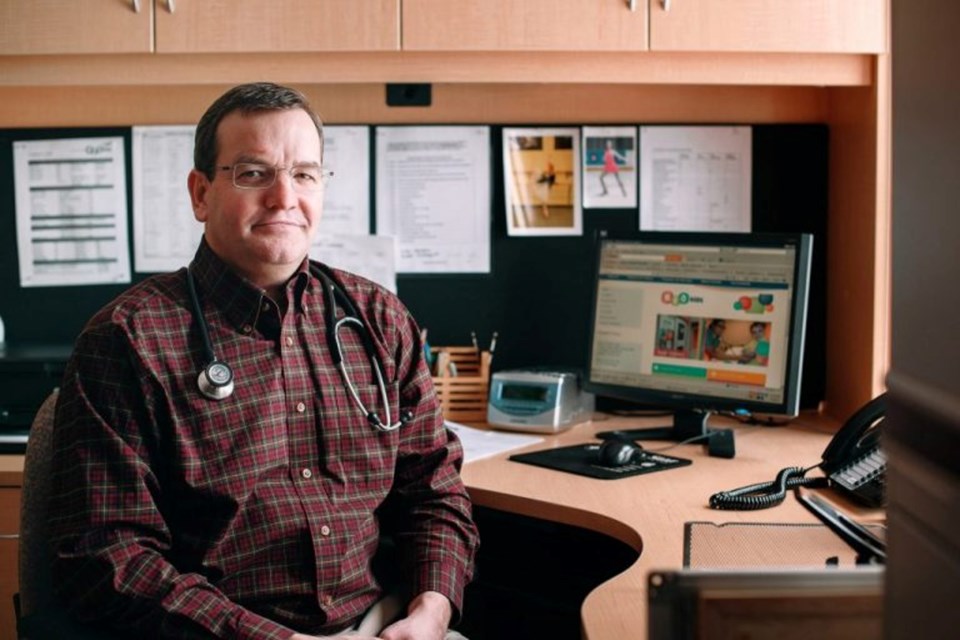The response to the respiratory disease situation for children is going well at Sudbury's Health Sciences North but Sudbury pediatrician Dr. Sean Murray said he cannot predict what this winter will bring.
Murray, who is a pediatric physician at Sudbury's Health Sciences North (HSN), was commenting on the growing number of children showing up at the hospital with respiratory illnesses.
"The frequency of viral infections in children is definitely, at least subjectively, higher than what we've seen in the past," Murray told Sudbury.com in an interview Wednesday.
"It hasn't translated into a huge day-to-day difference in terms of admissions to our unit yet. But definitely there seem to be more respiratory illnesses on the floor at any given time," he added.
The situation is similar to what has happened at other hospitals in Ontario where youngsters are being brought into emergency rooms with symptoms of respiratory sickness such as influenza, RSV (Respiratory Syncytial Virus) and COVID-19. At Toronto's Hospital for Sick Children, the decision was made last Friday to ramp down surgeries because there were so many youngsters being admitted to the hospital's Intensive Care Unit (ICU) which was above 127 per cent capacity.
Murray added that some of the sickest children with respiratory diseases that are showing up at HSN are those aged three and younger, who have come into life during the COVID-19 pandemic and do not have immunity to viral infections.
"So those that have been born and raised during COVID times with masking mandates present, and I think what has happened and this has been articulated by other people, is that the innate immunity for these viral infections which is picked up as you get exposed, it's just not there.
Murray added that many of these younger patients are having a more severe reaction to the infections.
"Interestingly, we've got and have had some admissions to hospital with severe respiratory illness where the kids have been exposed to relatively common viruses that in the past might not have led to as much burden of illness. And the kids that are young and more vulnerable therefore, tend to be reacting a little bit more severely to even more common infections. So that's kind of a rundown of what we're seeing."
Murray's advice to parents is to keep an eye on their children who might experience some common symptoms associated with a respiratory virus. But he said that doesn't mean running out to the Emergency Room every time the child has a sniffle.
"I think parents need to be diligent when their child is unwell. And certainly if you're worried about your child in any way they should present to some form of health care provider, be it their primary care physician, or nurse practitioner, a walk-in clinic or the Emergency Room if those other two aren't available," said Murray.
He quickly added that any time a child has a breathing problem, the child "should get checked out for sure."
Murray said he could not comment on what was happening in other hospitals, such as Sick Kids, but said the health care providers at HSN are watching carefully to see how the rise in respiratory illness is unfolding.
"So we don't know what's going to happen in the middle of the wintertime, but we are all concerned as pediatric health care providers at HSN, about what the implications of this particular new wave of viral infections is going to mean for our unit, and the units that are present across the Northeast," Murray said.
He added that the medical community is aware and is closely monitoring the collective health across the North.
"I think the public needs to be reassured that we're working very hard and diligently around surge planning, and making sure that as a collective in the Northeast, we're doing our best to work together to make sure that any issues that arise are mitigated."
In his final comment during the interview, Murray said he supports the position of Ontario chief medical officer Dr. Kieran Moore when it comes to masking, which is to wear masks anytime one is around vulnerable people, such as children and elderly, even if they're indoors.
"Make sure they mask up when they're indoors, that will include children in public settings as well, in order to reduce the risk of infection and transmission. And of course, diligence around hand washing and staying home when you're sick."
Len Gillis covers health care and mining for Sudbury.com.
